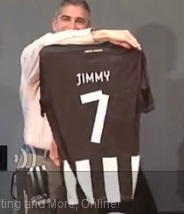
What do you do when a Brazilian court freezes money and blocks new registrations for your “program” in that country, amid serious pyramid-scheme allegations?
Well, if you’re TelexFree, you file losing appeal after losing appeal. And then, while continuing the pyramid battle, you change your logo so no one can get the idea you ripped it off from the 2010 World Badminton Championship in Paris.
After that, you arrange for cameras to be rolling in the United States to capture the arrival of the limousine at the self-staged event (in Miami?) to announce your sponsorship of the Botafogo soccer club in Rio de Janeiro.
Then, with great fanfare, you videotape the signing of the Botafogo contract — and make sure the cameras capture your top executives at the signing ceremony wearing a Botafogo jersey. (Among the executives are James Merrill and Carlos Wanzeler.)
Finally, you make sure that Carlos Costa — your most well-known executive — gets a chance to be shown evangelizing for TelexFree and gesticulating wildly on YouTube while wearing a Botafogo jersey with the new TelexFree logo affixed.
(If you’re TelexFree, it apparently also helps if you use a split screen to show happy TelexFree affiliates wearing the old logo, a man holding what appears to be a check while the logo of the Best Western hotel chain and the old TelexFree logo appear in the background — and the arrival of a limo, of course.)
Comments
5 responses to “With Carlos Costa Gesticulating Wildly, TelexFree, An Alleged Pyramid Scheme, Says It’s Now A Soccer Benefactor”
The shirt Costa is wearing looks more like anything you can get made up at a local store that does that stuff (I get them made myself – about $21 ea.).
I can not find a shirt like that as an official jersey for the team.
And why wouldn’t the team have it on their official jerseys?
They certainly have no problem putting real business sponsors on their jerseys – and very prominently.
There is also no announcement of gaining a sponsor that most professional teams do or preview of a new jersey with the logo.
Just a few things that popped into my head watching the video. lol
Unfortunately this is very much true. The Brazilian blogosphere and social networks are electrified with the news. All major sports portals have given the news, Botafogo execs gave further interviews about the case and, apparently, nobody is denying it.
The state attorney that is currently suing TelexFREE in behalf of the embezzled (and of the general public) has already spoken, saying two VERY serious things that should have frozen the spines of anyone responsible on behalf of Botafogo (if anyone there is “responsible” at all)
a) That any funds received from TelexFREE (even abroad) may be blocked by the Brazilian justice when they enter the country, or they can be blocked abroad, by an agreement between Brazil and the country where they are deposited. This amounts to say that Botafogo cannot use the sponsorship money LEGALLY, which is already quite something.
b) That its association with TelexFREE may trigger a cumplicity, with Botafogo being liable for association with a third party engaged in the crimes TelexFREE is currently accused of: embezzlement, fraud, extortion by means of false claims, tax evasion, currency smuggling and money laundering.
Journalists have pointed that TelexFREE is using Botafogo (which is about to play the Continental tournament for the first time after 17 years) to promote itself as a “serious” company in the neighbouring countries where it is already operating (Bolivia, Paraguay, Colombia, Peru and Argentina). Since TelexFREE really IS a ponzi scheme, it will eventually breakdown there as well, which will cause deep and long-lasting damage to the sporting image of Botafogo, and of Brazil.
Botafogo, however, is no stranger to such associations. From 1980 until 1993 the club was ruled by mobster Emil Pinheiro, which ran an ilegal lottery and, supposedly, was actively smuggling weapons, drugs and electronics.
Possible reasons why TelexFREE and Botafogo signed the deal:
a) Bringing money into Brazil without having it blocked by the Justice. In this case, Botafogo is performing the role of a “laranja” (literally, “orange”, but also a slang for someone who overtly owns property on behalf of someone who can’t own it). This is CRIME under Brazilian law. And, if the property (or money) originates from criminal sources (which is the case, if TelexFREE is found guilty), then this crime is equated to a FELONY (=money laundering).
In this case TelexFREE brings a given amount and Botafogo uses it to pay for its expenses (which are, BTW, expenses of TelexFREE owners).
b) Making new money “buying and selling” contracts of players. Payments made abroad, out of the reach of Brazilian justice.
In this case, the owners of TelexFREE are already planning their next step, when the scheme bursts in a few more places. When they finally make a lot of bucks they’ll gently fade away and become agents of sportspeople.
However, they may do this to launder the money they earned in Brazil and elsewhere. When the money is already clean, the partnership will be over (one-year only) and they will be enjoying their retirement somewhere.
[…] a longtime sponsor of the Botafogo soccer club in Rio de Janeiro, may be none too pleased with the club’s deal that brought on TelexFree as a No. 2 […]
[…] Pretty’s covered the Botafogo story and subsequent fallout with their main sponsor, Viton […]